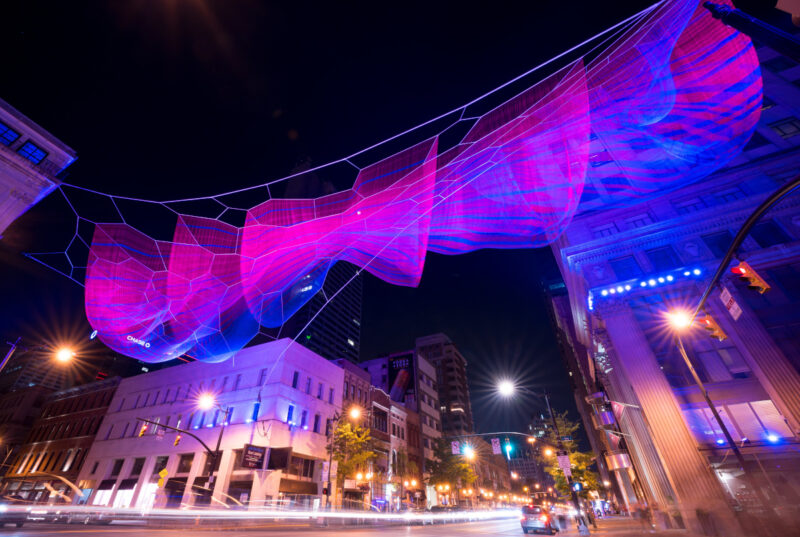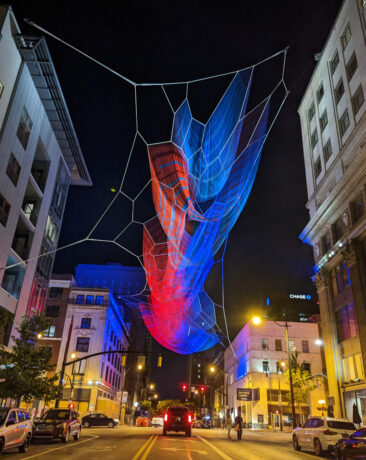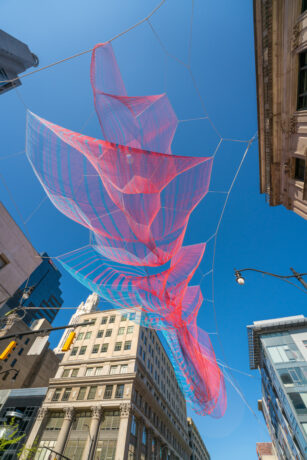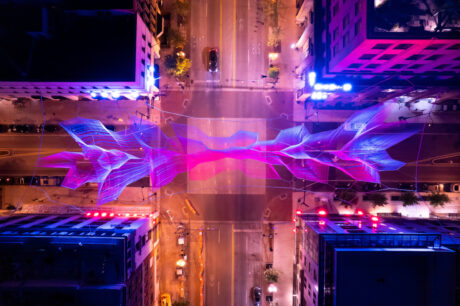
Current, a fiber sculpture by artist Janet Echelman, made its debut as a public art centerpiece in downtown Columbus, Ohio this fall. The sculpture, made up of 78 miles of twine that ripple in the breeze above a popular downtown intersection, is illuminated by a mesmerizing nightly lighting program controlled by the ETC Mosaic system with help from City Theatrical’s Multiverse® wireless DMX technology.
 The piece, inspired by the history of the city, spans 229′ above the intersection of Gay and High streets in downtown Columbus. This is the former home of one of many metal arches that stretched over the streets of Downtown Columbus at the end of the 19th century. These arches, adorned with early lightbulbs, functioned as some of the country’s first electric streetlights. To honor this history, Echelman created an “arch” of her own, stretching her signature fibers over the intersection and suspending them between four buildings.
The piece, inspired by the history of the city, spans 229′ above the intersection of Gay and High streets in downtown Columbus. This is the former home of one of many metal arches that stretched over the streets of Downtown Columbus at the end of the 19th century. These arches, adorned with early lightbulbs, functioned as some of the country’s first electric streetlights. To honor this history, Echelman created an “arch” of her own, stretching her signature fibers over the intersection and suspending them between four buildings.
Ardra Zinkon, CLD, IALD, and her team at Zinkon Creative Studio worked with Echelman to design the lighting and installation for the project. Intense modeling ensured proper fixture placement and that uniform lighting and brightness was achieved according to IES recommended levels. It took more than a year of renderings, modeling, and calculations to get the lighting systems right, hitting all the right artistic notes and technical requirements.
“We had multiple calls with the artist and the owner to discuss how the piece would be lit and from what locations and angles,” says Zinkon. “We provided renderings from these angles in different color sequences to help her visualize the final design and make sure we clearly understood all the design goals for the project.” Once that was approved, Zinkon was also instrumental in coordinating installation on the building facades, three of which are historic and required significant submissions to the downtown commission to achieve permitting approvals. They also engaged an electrical engineer, Tim Pool with Tec Inc. Engineering and Design, to coordinate the power aspect.
 To implement the lighting design, Zinkon turned to ETC’s Mosaic control system. The design emphasizes the sculpture’s attributes without drawing too much attention to the lighting itself. “Blending color for the sculpture was more about accentuating the colors of the materials selected and then developing slight shifts in the color to create additional movement within the piece,” Zinkon shares. “One of the sequences we built actually included a ‘striping’ of the fixtures, where every other unit was a different color to create additional depth along the length.”
To implement the lighting design, Zinkon turned to ETC’s Mosaic control system. The design emphasizes the sculpture’s attributes without drawing too much attention to the lighting itself. “Blending color for the sculpture was more about accentuating the colors of the materials selected and then developing slight shifts in the color to create additional movement within the piece,” Zinkon shares. “One of the sequences we built actually included a ‘striping’ of the fixtures, where every other unit was a different color to create additional depth along the length.”
Once they were ready to install, Zinkon reached out to Dan Boggess, CEO of Village Controls and ETC dealer in Columbus to act as lighting integrator and programmer. “We have a strong faith in Village Controls and working with Dan and his team was a critical part of the project’s success.”
For Boggess, installing the piece was unlike any project that he’s worked on in the past. “On paper, it all makes sense. It works and looks great,” he says. “Then it’s very different when all of a sudden you’re on a lift on the facade of a building downtown in a major city.” The install required the city to block off the entire intersection and the team had three separate crews on lifts working to set the sculpture and lights in place.
The sculpture, suspended in midair between four buildings, required its accompanying lights to communicate across a major intersection with no way to create a physical ethernet or DMX connection to every lighting location. This is where the Multiverse Wireless DMX from City Theatrical became indispensable. The crew based the control system out of one building and transmitted wireless DMX signals to receivers controlling fixtures a hundred feet across the street. Installation was precarious, but once everything was in place the DMX was rock solid.
Mosaic and Multiverse weren’t the only things communicating. Boggess tells ETC that programming the show in such a public area turned their workspace into a beacon for curious locals. “Being in this downtown space, a lot of weird, colorful characters would come by, especially after the bars would let out,” he says. “They would come up to Janet – and would know her by name! – to say, ‘Janet, I love this. Tell me all about it.’ They would want to sit there to talk! And we’d politely try to be like, ‘Hey, we need you to leave us alone because we’ve got to program this thing!’ That was an adventure. That was fun.”
 Both Boggess and Zinkon agreed that this project was all about supporting Echelman’s artistic vision. “It’s important for us to remember nobody came up to us and was like, ‘Dan, this is cool.’ Or ‘Ardra, this is cool,’” says Boggess. “They came up and said ‘Janet, this is amazing.’ Janet’s the star and we’re just there to support her.”
Both Boggess and Zinkon agreed that this project was all about supporting Echelman’s artistic vision. “It’s important for us to remember nobody came up to us and was like, ‘Dan, this is cool.’ Or ‘Ardra, this is cool,’” says Boggess. “They came up and said ‘Janet, this is amazing.’ Janet’s the star and we’re just there to support her.”
“We love ETC and always use ETC control systems because it doesn’t matter what you need us to control – they can do it. And frankly, I think they’re the only manufacturer who can do that,” says Boggess. “I always feel comfortable taking ETC onto a project.”
Further information from ETC: etcconnect.com


